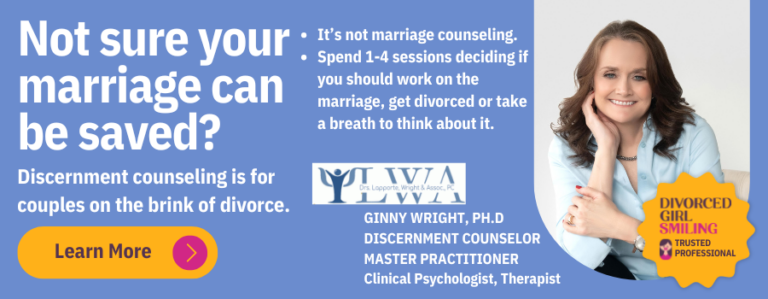Does couples counseling work? Consider a common scenario: Jack is convinced that his marriage with Diane is over. After years of struggle, arguments and distance, he announces his already-formulated plan to end the marriage. Diane is shocked. She knew they had problems but didn’t think he would actually “pull the plug” on their marriage. In turn, Jack is astonished that his proclamation comes as a surprise; they both knew the relationship was in trouble and both had threatened divorce in moments of anger.
Both spouses panic. Each confides in friends, co-workers, and family members. Almost certainly, they hear a chorus of: “You should try couples counseling.”It is a reasonable suggestion but likely to be unhelpful for this couple. Let’s examine why.
Does couples counseling work? The Value of it.
Couples counseling can be a wonderful tool for partners who are struggling. The focus of therapy may be on improving communication, addressing obstacles to intimacy, increasing perceived security in the relationship, managing the impact of others (e.g., children, in-laws) on the relationship, conflict resolution, etc.
Typically, couples see a professional therapist who has received specialized training in understanding the dynamics of intimate relationships and “best practices” for helping couples navigate through tough times. There are many different approaches and models of couples therapy and therapists bring their own style, methods and goals into the work.
That said, most models of couples therapy share some critical strategies, including: increasing mutual empathy, improved negotiation between partners, emotional reengagement, affect regulation and a focus on individual contributions to the joint problems.
How effective is couples counseling?
It depends.
If you do a Google search to find out the success rate of couples therapy, you are likely to find success rates from 70% to 98%. Wow! That seems almost impossible, right? Here’s the catch: these numbers come from academic studies of therapy success which must use strict guidelines for research, including using a narrowly defined sample.
Research often does NOT include couples: who are already considering divorce, who discontinued treatment prematurely, where one partner has a mental health diagnosis, etc. Also, in academic research, the therapy is typically provided by clinicians who are overseen by the researchers and adherence to a treatment protocol is strictly monitored.
There are far fewer studies that look at the effectiveness of couples therapy as practiced in real-world settings, rather than as part of research. Results of those studies are less optimistic. Specifically, in common-practice couples therapy, about half of couples fail to complete therapy, around 40% achieve modest positive relationship adjustment, and 30-60% of those will relapse back to pretreatment levels.
Can we predict when couples counseling is likely to be successful? One of the most cited predictors of successful couples therapy is a strong therapeutic alliance. A therapeutic alliance means that both members of the couple feel a connection with the therapist and participate in a collaborative relationship; the triad has a mutual understanding of, and engagement in, the therapeutic work. Another often-cited critical factor that determines the success of couples therapy is whether BOTH spouses are motivated to fix the marriage and motivated to consider their own contributions to the problems.
Jack and Diane
This last point brings us back to Jack and Diane.
Jack has already started planning his exit and has spent a long time coming to the conclusion that the marriage is over. Diane begs him to try therapy; he wishes he could believe that marriage counseling would be successful. But the thought of starting marriage therapy brings a strong and negative visceral response. He tells Diane that he doesn’t think counseling can be helpful.
Sadly, Jack is probably right. If they were to start therapy together, the work on “fixing” would begin. But Jack isn’t sure he wants to fix the marriage. So, they might spend weeks with the therapist trying to help them identify the problems and providing strategies for resolving those problems. Because Jack isn’t all-in, he feels like he is seen as the bad guy for not doing his part, and he becomes increasingly defensive at a time when increased vulnerability is key.
And then something tragic happens. Couples counseling “fails” and the couple is left thinking, “even therapy couldn’t save our marriage.”
Discernment counseling: an option for mixed-agenda couples
Jack and Diane are what we call a mixed-agenda couple. One wants out; the other wants to save the marriage. And now they are on the brink of divorce.
Discernment counseling is a short-term, structured process designed specifically for couples in this situation. There is no attempt to fix the marriage, and both spouses’ positions are respected. The goal of discernment is to help the couple gain clarity and confidence as they make decisions about the future of the marriage.
By helping them gain a deeper understanding of what has happened in the marriage and each person’s contributions to the problems, they ultimately choose a direction. Specifically, they choose one of three paths: postpone a decision, proceed to separation/divorce, or commit to “all in” course of marriage therapy for a minimum of six months, during which time divorce is completely off the table.
Until a decade ago, mixed-agenda couples had few resources available. Couples on the brink of divorce either tried half-hearted therapy (usually unsuccessfully) or dissolved the marriage without clarity and confidence in that decision. Discernment counseling fills a gap and gives an option for these highly stressed couples.

Dr. Wright graduated with distinction in psychology from Duke University in 1986. Before starting her graduate studies, she spent a year working at a runaway shelter outside of Washington, D.C. She then earned her doctoral degree from the Child & Family Clinical Psychology program at Michigan State University and completed her internship at Children’s Memorial (now Lurie Children’s) Hospital in Chicago. Prior work positions include staff psychologist at Children’s Hospital of Wisconsin and staff psychologist at the Child Protection Center in Milwaukee, Wisconsin.
Dr. Wright co-founded Drs. Lapporte, Wright & Assoc., PC in 1994. She sees clients of all ages and works with individuals, couples and families. Specializations include: Discernment Counseling, child and adolescent psychology, family systems therapy, couples therapy, medical psychology and performance psychology.
Like this article? Check out “Talking to Your Spouse about Discernment Counseling”
Bradbury, T. N. , & Bodenmann, G. (2020). Interventions for couples. Annual Review of Clinical Psychology, 16(1), 99–123.
Lebow, J.L, Chambers, A.L., Christensen, A & Johnson, S.M. (2012). Research on the treatment of couple distress. Journal of Marital and Family Therapy, 38(1), 145–16.
Roesler, C. (2019). Effectiveness of Couple Therapy in Practice Settings and Identification of Potential Predictors for Different Outcomes: Results of a German Nationwide Naturalistic Study. Family Process, 59(5).





















All this sounds great and wonderful and completely unrealistic. Most divorce attorneys will tell you that when the husband wants to end the marriage it’s because he already has another woman lined up to fill the void he’s purposely created. He will not be honest in discernment counseling so what’s the point?